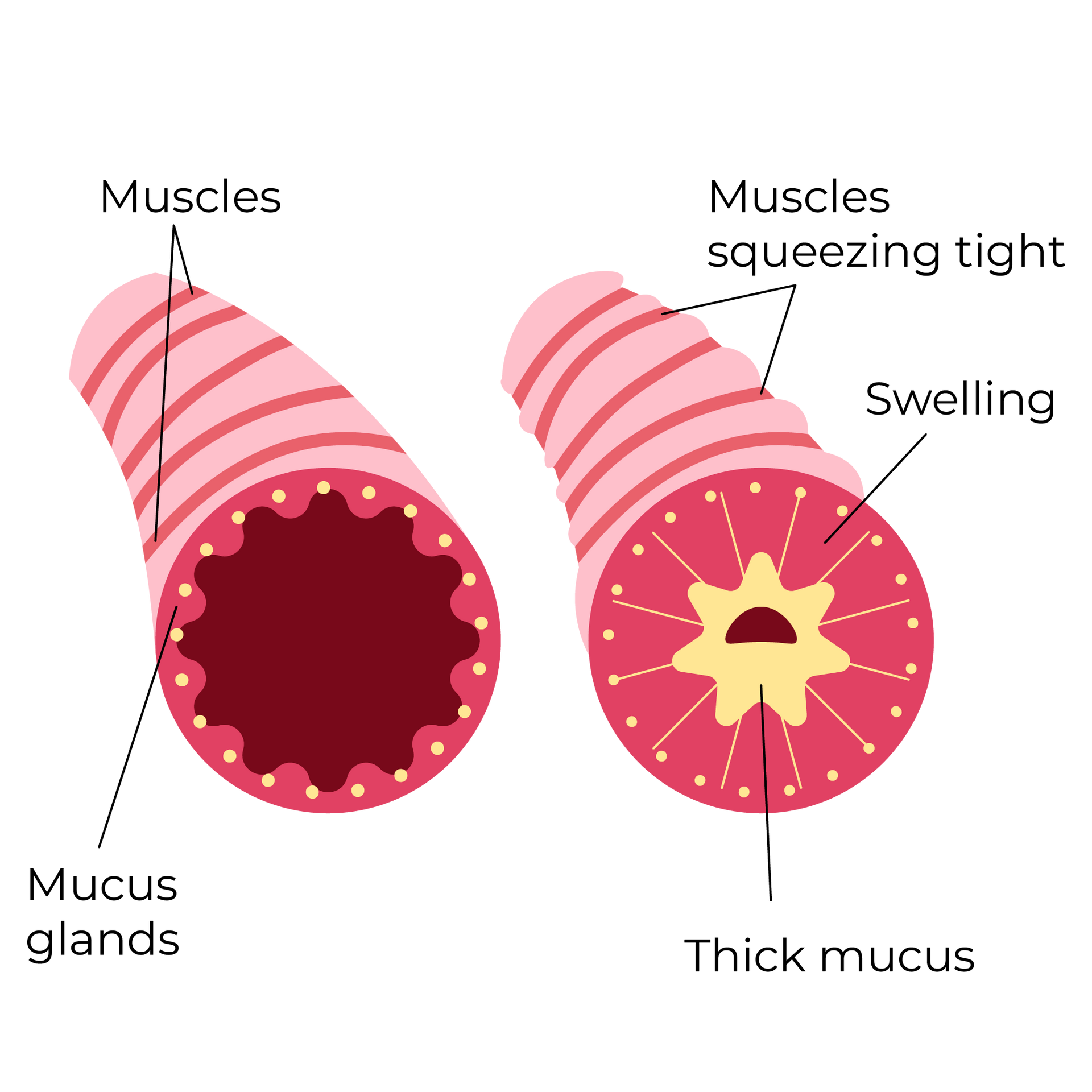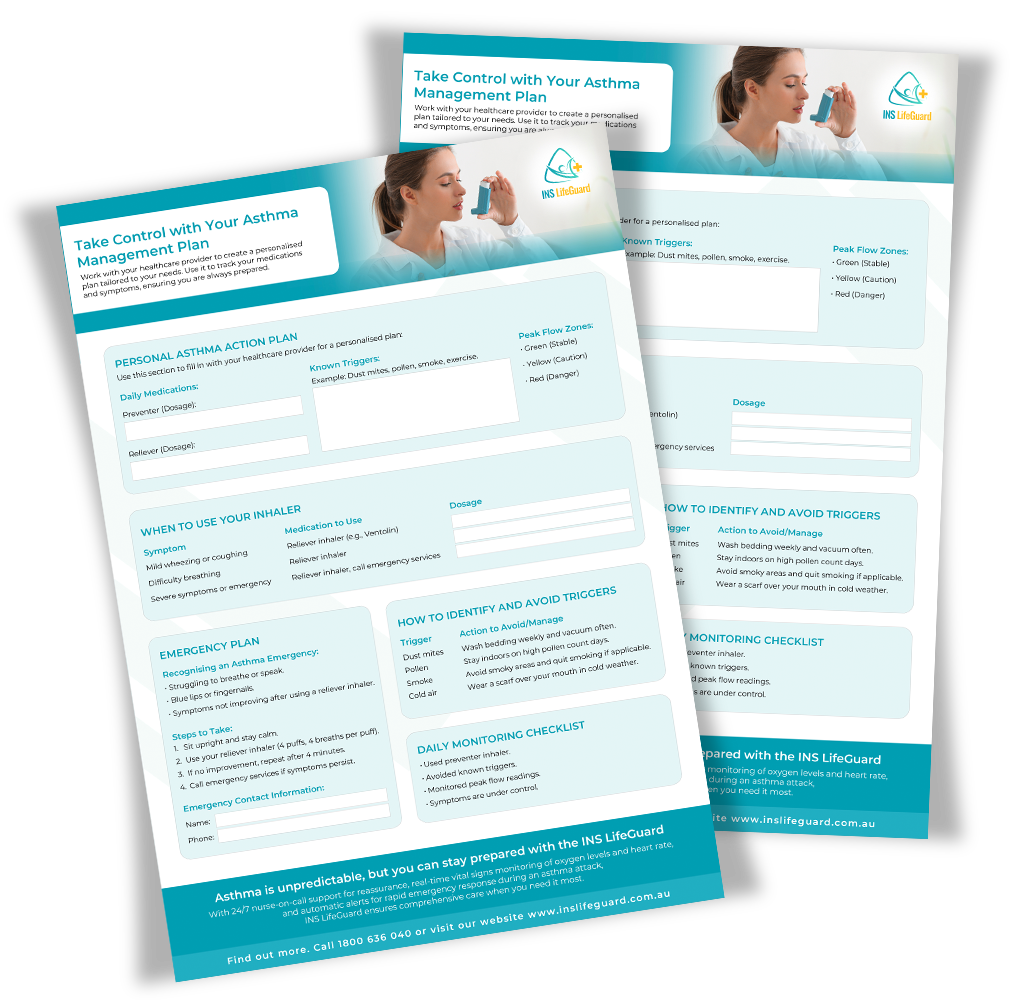INS LifeGuard
Breathing Easy: Understanding Asthma and When to Seek Help

Asthma is a chronic respiratory condition affecting millions worldwide, including an estimated 2.7 million Australians, one in nine. Characterised by inflammation and narrowing of the airways, asthma can make breathing difficult and sometimes life-threatening. While asthma is manageable with proper care, understanding its causes, symptoms, and when to seek help is critical for maintaining well-being.
What is Asthma?
Asthma is when the airways become inflamed and narrow, often producing excess mucus. These changes make breathing difficult and trigger coughing, wheezing, and shortness of breath. Asthma impacts people of all ages but is most often diagnosed during childhood. While its severity varies from person to person, asthma requires ongoing management to prevent flare-ups and complications.

Symptoms of Asthma
Asthma symptoms can range from mild to severe, often worsening during physical activity, exposure to allergens, or at night.
Key symptoms include:
- Shortness of breath or difficulty breathing.
- Tightness or pain in the chest.
- Persistent coughing, especially at night or early morning.
- Wheezing or a whistling sound when exhaling.
- Increased mucus production in the airways.
What Causes Asthma?
The exact cause of asthma remains unknown, but various factors contribute to its development and exacerbation:
Genetics
A family history of asthma or other allergic conditions increases the likelihood of developing asthma.
Environmental Triggers
Exposure to allergens like dust mites, pollen, pet dander, and mould can trigger asthma symptoms.
Respiratory Infections
Viral infections, particularly during childhood, can contribute to asthma development.
Lifestyle and Environment
Smoking, air pollution, and occupational exposure to irritants (like chemicals or dust) may lead to asthma.
Exercise-Induced Asthma
Physical activity can exacerbate symptoms, particularly in cold or dry air.
Managing Asthma
Asthma management involves controlling symptoms, preventing attacks, and maintaining a high quality of life.
Key strategies include:
Medication
Inhalers and medications reduce inflammation and open airways during flare-ups.
Avoiding Triggers
Identifying and minimising exposure to allergens and irritants is essential.
Monitoring
Regularly assessing lung function and tracking symptoms helps to adjust treatment.
Asthma Action Plan
Collaborating with a healthcare provider to develop a personalised plan ensures preparedness for managing symptoms or attacks.
Managing Asthma with the Right Treatment
While asthma cannot be cured, it can be effectively managed with proper treatment and a daily plan. With the right approach, asthma can be well-controlled, allowing individuals to lead active, healthy lives.
The three main types of asthma medications are:
Relievers
Fast-acting medications that relax the muscles around the airways, providing immediate relief during an asthma attack.
Preventers
Medications taken daily to reduce inflammation inside the airways and make them less sensitive to triggers, helping to maintain long-term control.
Combination Therapies
Preventers that contain two different medicines, offering enhanced control for more severe cases.
By working closely with a healthcare provider to tailor your asthma management plan, you can identify the right combination of treatments to suit your needs.
Take Control of Your Asthma Today
Do You Have Asthma? Download our printable Asthma Management Guide to take control of your health. Fill it in with your healthcare provider to create a personalised plan and keep it handy to track your medications and symptoms.

When to Call for Help
Despite best efforts, asthma attacks can happen. Knowing when to seek medical assistance is critical.
Signs You Need Immediate Help:
- Difficulty speaking due to breathlessness.
- Cyanosis (bluish lips or fingertips).
- A rapid worsening of symptoms despite using a rescue inhaler.
- Persistent chest pain or pressure.
How INS LifeGuard Can Help
Asthma can be unpredictable, but you don’t have to navigate it alone. INS LifeGuardian provides round-the-clock support for individuals with asthma, ensuring safety and peace of mind.
Key Features for Asthma Management:
24/7 Nurse-on-Call Support
Our qualified nurses can guide you through symptoms or an emergency, providing professional assistance when it matters most.
Health Monitoring
Advanced integrations with INS LifeGuardian® App, Apple Watch, and other smartwatches enable real-time tracking of vital signs, including oxygen levels and heart rate.
Emergency Response
Automatic alerts ensure timely medical attention in the event of a severe asthma attack.
Medication Reminders
Customisable notifications help ensure adherence to prescribed asthma treatment.
Contact INS LifeGuard to gain access to tools and support that empower you to manage your condition confidently.

About
INS LifeGuard is the only 24/7 nurse on-call personal and medical monitoring in Australia. We provide monitoring technology for both in the home and on the go and can also monitor other provider's equipment. Our services are suitable for anyone wanting support to stay independent such as the elderly, those with medical conditions and disabilities plus enhancing safety and security for lone workers.
Related Articles

-
Visit our website here
I hope you enjoy reading this blog post
INS LifeGuard is the only nurse on-call personal and medical alarm service in Australia. If you would like more information about INS LifeGuards solutions, visit our website here.
I hope you enjoy reading this blog post.
INS LifeGuard is the only nurse on-call personal and medical alarm service in Australia. If you would like more information about INS LifeGuards solutions, visit our website
here.

INS LifeGuard is the only nurse on-call personal emergency response service in Australia. We have a commitment to healthcare innovation which includes personal alarms and medical alert solutions that make independence easier, safer and more enjoyable.
Our services support Seniors, Carers, Providers, NDIS Participants, Retirement Villages, DVA, Lone Workers and anyone that wants the security that help is a press of a button away.
LATEST POSTS
PO Box 485 Unanderra NSW 2526 Australia
INS LifeGuard
International Enquiries
INS CareCall supplies and monitors emergency response equipment and services, including hardware manufactured by Chiptech, Smart-Caller, SmartLink, and the LifeGuard L-Series Diallers.
Monitoring of alarms is provided through INS LifeGuard's unique Emergency Response Centre, which is the only personal alarm response centre staffed by qualified nurses. This is an important distinction.
Quicklinks
Supporting
PO Box 485 Unanderra NSW 2526 Australia
INS LifeGuard
International Enquiries












